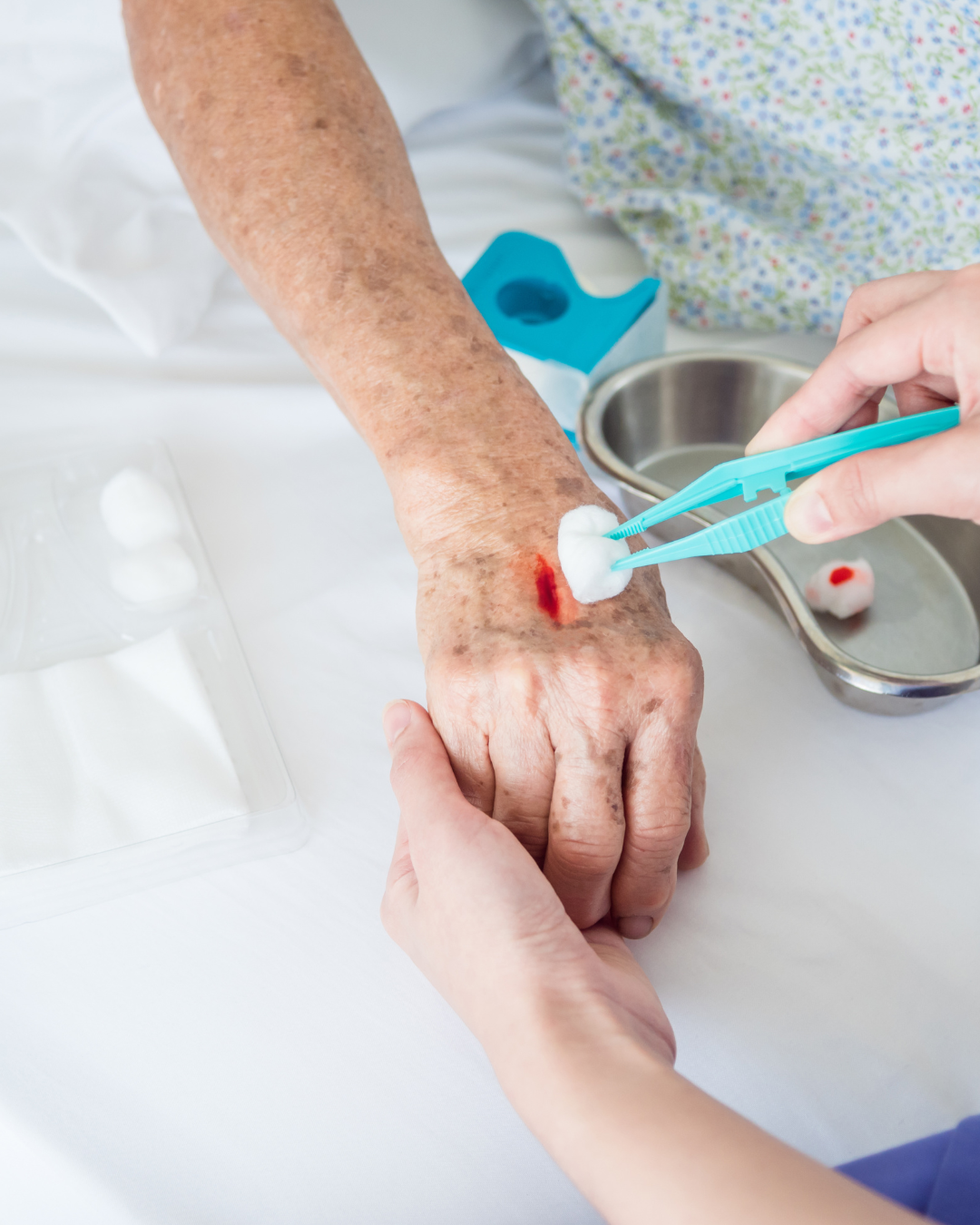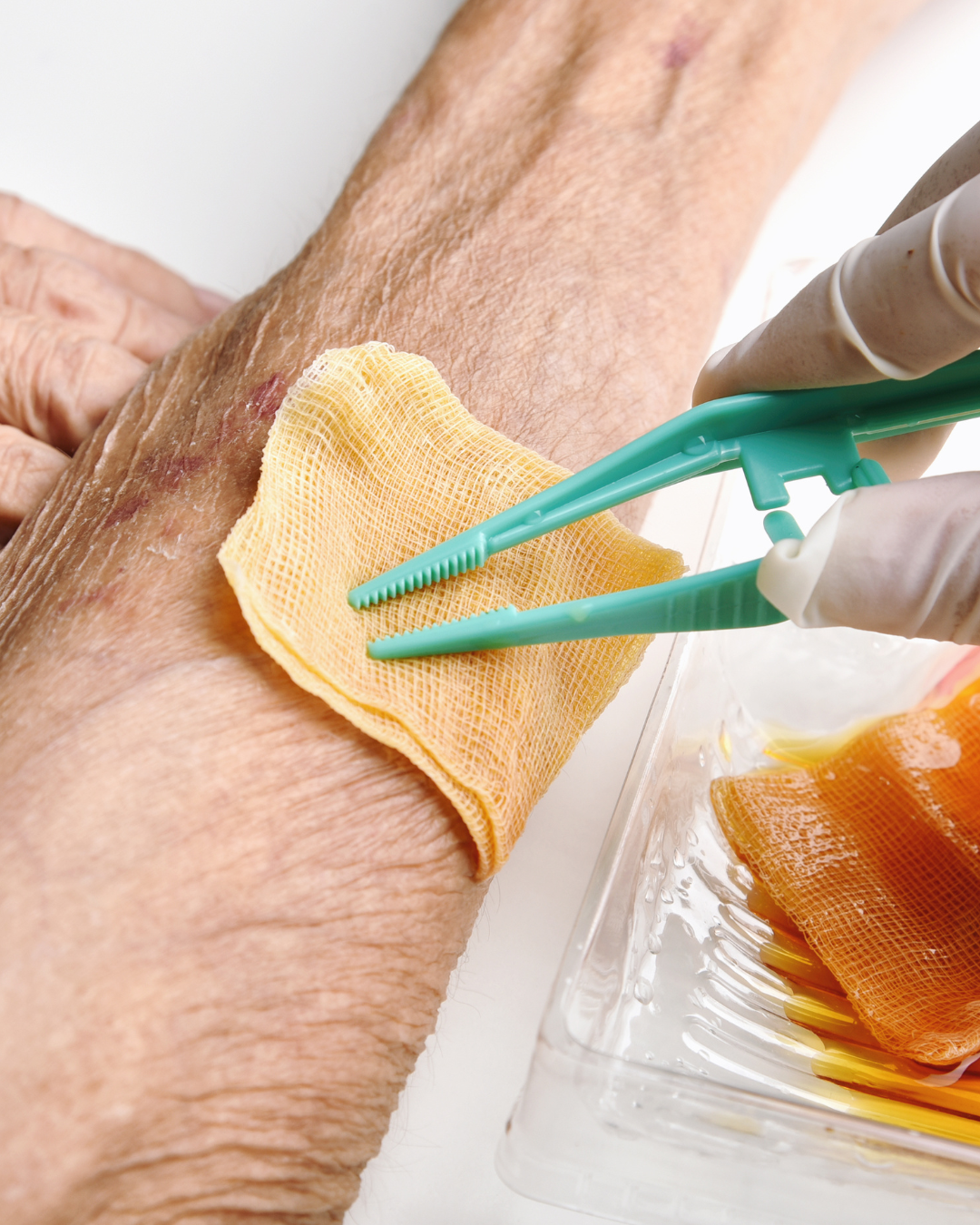Chronic Non-Healing Wound Specialist
Non-Healing Wound Care with Anodyne Pain and Health Group
Causes of Non-Healing Wounds:
Chronic or non-healing wounds are wounds that do not heal in an orderly set of stages and in a predictable amount of time the way most wounds do; wounds that do not heal within three months are often considered chronic. Various factors can contribute to the development and persistence of chronic wounds, including:
Blood Flow and Oxygen Issues: Poor circulation, often due to conditions like peripheral artery disease or diabetes, can hinder blood flow and oxygen delivery to the wound area, impeding healing.
Infection: Chronic wounds can become infected, which can further delay healing. Bacteria in the wound can lead to continuous inflammation, preventing proper wound closure.
Diabetes: Diabetes can lead to neuropathy (nerve damage), which can cause a lack of sensation in the feet. Minor injuries might go unnoticed and develop into chronic wounds. High blood sugar levels also slow the healing process.
Pressure Ulcers: Constant pressure on certain body parts, often experienced by individuals who are bedridden or in wheelchairs, can lead to pressure ulcers or bedsores, a type of chronic wound.
Venous Insufficiency: This condition, where the leg veins don’t allow blood to travel back to the heart efficiently, can cause blood to pool in the legs, leading to swelling and ulceration.
Immune System Issues: Conditions that weaken the immune system, such as HIV/AIDS or chemotherapy for cancer, can make it more difficult for the body to heal wounds.
Age: Older adults often have slower healing processes due to weaker immune systems and potential comorbidities.
Nutritional Deficiencies: Poor nutrition, especially deficiencies in vitamins and minerals essential for wound healing (like Vitamin C and Zinc), can impair the body’s ability to heal.
Lifestyle Factors: Smoking and alcohol consumption can also impair wound healing.
Repeated Trauma: If a wound is in a location that is continuously subjected to movement or pressure, it may become chronic.
Management of chronic wounds often requires addressing these underlying causes, maintaining a clean wound environment, and, in some cases, specialized wound care treatments.

Non-Healing Wound Care with Anodyne Pain and Health Group
- Keeping the wound clean and dry.
- Using appropriate wound dressings.
- Managing underlying health conditions (like blood sugar levels in diabetics).
- In some cases, using medications or surgery.
Prevention is vital. Regular inspections, proper hygiene, suitable footwear, controlling health conditions, and regular healthcare check-ups are essential.
Signs You Need Specialized Wound Care:
- Slow healing of wounds.
- Signs of infection (redness, warmth, swelling, pus).
- Wounds on the feet, particularly in diabetics.
- Changes in skin color or temperature around a wound.
- Numbness or tingling, indicating potential neuropathy.
- Persistent pain in a wound.
- Presence of calluses or corns.
- Change in the size or depth of the wound.
Seek medical advice promptly if you notice these signs.
Our Services at Anodyne Pain & Health Group:
Our approach is comprehensive, focusing on enhancing your quality of life. We provide meticulous wound cleaning suitable dressings, advanced skin graft technologies, and ensure optimal circulation for healing. Our team is dedicated to preventing infection, managing pain, and empowering you with knowledge for the best healing outcomes.
Benefits of Specialized Wound Care with Anodyne:
- Prevention of infections.
- Faster healing rates.
- Monitoring for complications.
- Reduction in the risk of severe outcomes like ulcers and amputations.
- Improved overall quality of life.
- Education on self-care and wound management.
- Management of chronic conditions.
- Psychological benefits, reducing stress and anxiety associated with chronic wound management.
Don’t let non-healing wounds impact your health and quality of life. Anodyne Pain and Health Group is your partner in managing and healing these challenging wounds, focusing on preventing infections, accelerating healing, and ensuring your comfort and well-being.
Why Should I Get Wound Care for Non-Healing Wounds?
Patients with chronic wounds often need to see a wound care specialist for several important reasons:
Expertise in Wound Healing: Our wound care specialists have specific training and expertise in the complex nature of wound healing. They understand the various types of wounds, such as diabetic ulcers, pressure ulcers, venous ulcers, and non-healing surgical wounds. They are skilled in the latest treatments and technologies for wound care.
Personalized Treatment Plans: Chronic wounds can have various underlying causes and may not respond to standard treatments. A specialist can develop a personalized treatment plan based on the patient’s specific type of wound, overall health, and individual needs.
Advanced Treatment Options: Our specialists can access advanced wound care treatments like, specialized dressings, debridement techniques, and skin grafts. These treatments may not be available in a general healthcare setting.
Prevention of Complications: Chronic wounds can lead to serious complications like infections, including potentially life-threatening systemic infections. A wound care specialist can identify early signs of infection and other complications, providing timely interventions.
Management of Underlying Conditions: Chronic wounds often occur due to underlying conditions like diabetes, vascular disease, or immobility. Specialists treat the wound and address these underlying conditions, which is crucial for the healing process.
Monitoring and Follow-Up Care: Healing a chronic wound often requires ongoing monitoring and adjustments to the treatment plan. Our wound care specialists provide this continuous care, which is vital for successful healing.
Education and Support: They educate patients and their caregivers on proper wound care techniques, nutritional needs, and lifestyle changes to promote healing and prevent future wounds.
Multidisciplinary Approach: Wound care often involves a team approach. A specialist coordinates this multidisciplinary effort to provide comprehensive care.
Seeing a wound care specialist is crucial for patients with chronic wounds due to their specialized expertise, access to advanced treatments, ability to manage complications and underlying conditions, and a comprehensive, multidisciplinary approach to care. We serve patients from Katy, TX, Rockwall, TX, Las Vegas, NV, and Marietta, GA.
